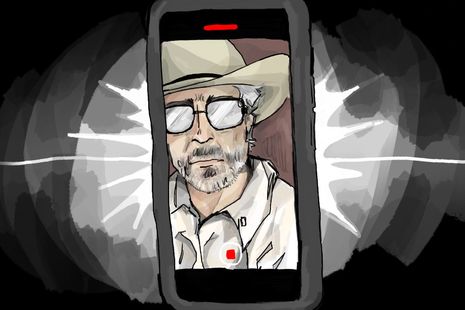The Eddington disconnect
Amanda Ljungberg sifts through the chaos of Ari Aster’s pandemic-era neo-Western

Eddington recalls the hyperspecific social implosion of May 2020, using the politically diverse milieu of a New Mexico town to embody the tensions inflamed by pandemic-era polarisation. Joaquin Phoenix is Sheriff Joe Cross, whose traditionalism clashes with Pedro Pascal’s more progressive mayor Ted Garcia, who seeks to open Eddington to the construction of a data centre by murky tech giant Solidgoldmagikarp. Worsening matters are Joe’s fragile wife Louise (Emma Stone), her mother Dawn (Deirdre O’Connell), and her chosen conspiracy peddler Jefferson Peak (Austin Butler). Tensions within and beyond Eddington soon take the film into darker territory, its characters unravelling before forces too vast to grasp.
It is shame, the word invoked by Jefferson Peak, that runs through Eddington, that overtakes the vulnerable and uncertain like, dare I say it, a virus. Characters are ashamed that they cannot understand what they are seeing and hearing, that they cannot escape their ultimate powerlessness. They recycle terms, mimic their media, take drastic action from half-baked ideas; the miscommunication that plagues the present day seems, according to Eddington, to have taken root in the ad hoc ideological posturing of 2020.
“The miscommunication that plagues the present day seems, according to Eddington, to have taken root in the ad hoc ideological posturing of 2020”
But Aster isn’t flogging the ‘toxic masculinity’ horse or the ‘social media bad’ one. The haze of screens delivering meaning (Joe constantly mediated, even through the lenses of his glasses) leaves Eddington, despite its youth adopting the language of progress, trapped in stubborn disconnect. However tired a talking point, however easy a target, Eddington serves as an engaging cautionary tale of how we are enlisted by comforting rhetoric, and manages to keep its portrayal of social media from feeling contrived. While there is the occasional indulgent satirising of wokeness, this seems less a takedown than a further displacement of Joe out of time; his blind traditionalism is just another variant of the same ideological theatre.
In a similar vein, then, the film is about the flattering narratives of victimhood. We see Joe respected and shunned, the only rational man and the rambling fool. His desperation to better a loveless home and a hapless department are never purely pitiable: he is, like everyone else, egotistical and self-serving. How quickly the nation’s social malaises spread and turn uncertainty to violence speaks, across the political spectrum, to the need to re-enter a legible order lost under quarantine.
Eddington is wonderfully inventive with genre and often incredibly funny. Nonetheless, teetering between drama and hyperbole becomes, at 150 minutes, increasingly disorienting. We test every red-button pandemic controversy: anti-maskers, BLM riots, QAnon, gun control. Generously, we are seeing an absurd, delirious vision of America. Less generously, Aster uses his acutely accurate backdrop of the 2020 internet to take easy shots at reductive thinkers, lament the utter impossibility of resolution, and wave ambiguously at the cloud of misinformation that looms, like the SolidGoldMagikarp plant, over it all.
“A film that chooses to be so utterly about today insists that it has a part to play in reconstructing a shared language of critical thought and empathy before the rift opened by ideological tribalism becomes irreparable”
While hints of a conceit arise in the final act which would have sharpened the threat of our present unreality, Eddington unfortunately frays into overstatement, or, worse, pointlessness. Perhaps it’s a question of whether you manage to remember that the Big Bad Corporation is the point. Aster occasionally leans too far into the shadowy vision of America which he mocks, his ‘aren’t we all to blame’ provocations eventually lapsing into listlessness. This may be what prevents Eddington from feeling consequential, but it is also what keeps it from avoiding condescension. The film is not “about” race, or class, or sexual abuse. Indeed, it does not have much new to say. It is not so much an index of America as it is an attempt, though perhaps not a satisfying one, at an apolitical Rauschenbergian collage of pandemic life.
Of course, nothing exists in a vacuum: ‘knowing’ what a film’s politics are feels particularly urgent in Trump’s America. Though avoiding didacticism, we risk falling into a ‘both sides are bad’ fatalism. For a film preoccupied with the dangers of false self-importance, sitting back and accepting that the barriers to meaningful communication are insurmountable leaves us equally stranded.
Is it misguided to both exploit and blame today’s incoherence? While the cynicism can feel directionless, it may be less an endpoint than a bid for us to sit with what feels missing and thereby confront the need for unmediated self-definition. A film that chooses to be so utterly about today insists that it has a part to play in reconstructing a shared language of critical thought and empathy before the rift opened by ideological tribalism becomes irreparable. The vast, overcrowded canvas of Aster’s America asks who preys on us when we are belly-up, physically and ideologically splintered, desperate to be told what to think. A sticker on Joe’s truck claims ‘YOUR BEING MANIPULATED’: Aster assumes we are removed enough to reckon with his nihilism rather than be consumed by it.
 News / Cambridge academics sign open letter criticising research funding changes22 February 2026
News / Cambridge academics sign open letter criticising research funding changes22 February 2026 News / University Council rescinds University Centre membership20 February 2026
News / University Council rescinds University Centre membership20 February 2026 News / Supporters protest potential vet school closure22 February 2026
News / Supporters protest potential vet school closure22 February 2026 News / Hundreds of Cambridge academics demand vote on fate of vet course20 February 2026
News / Hundreds of Cambridge academics demand vote on fate of vet course20 February 2026 Comment / A tongue-in-cheek petition for gowned exams at Cambridge 21 February 2026
Comment / A tongue-in-cheek petition for gowned exams at Cambridge 21 February 2026








